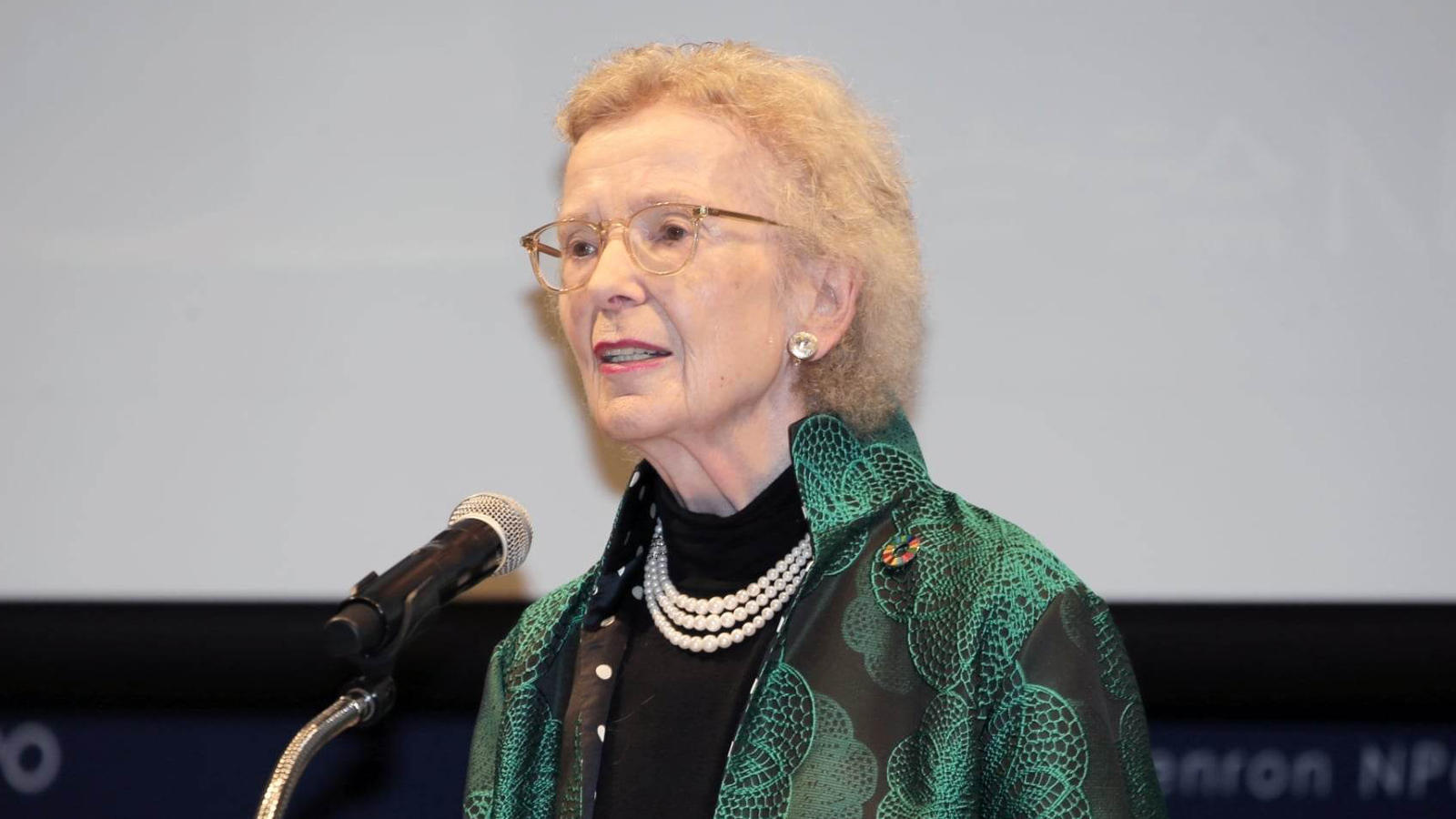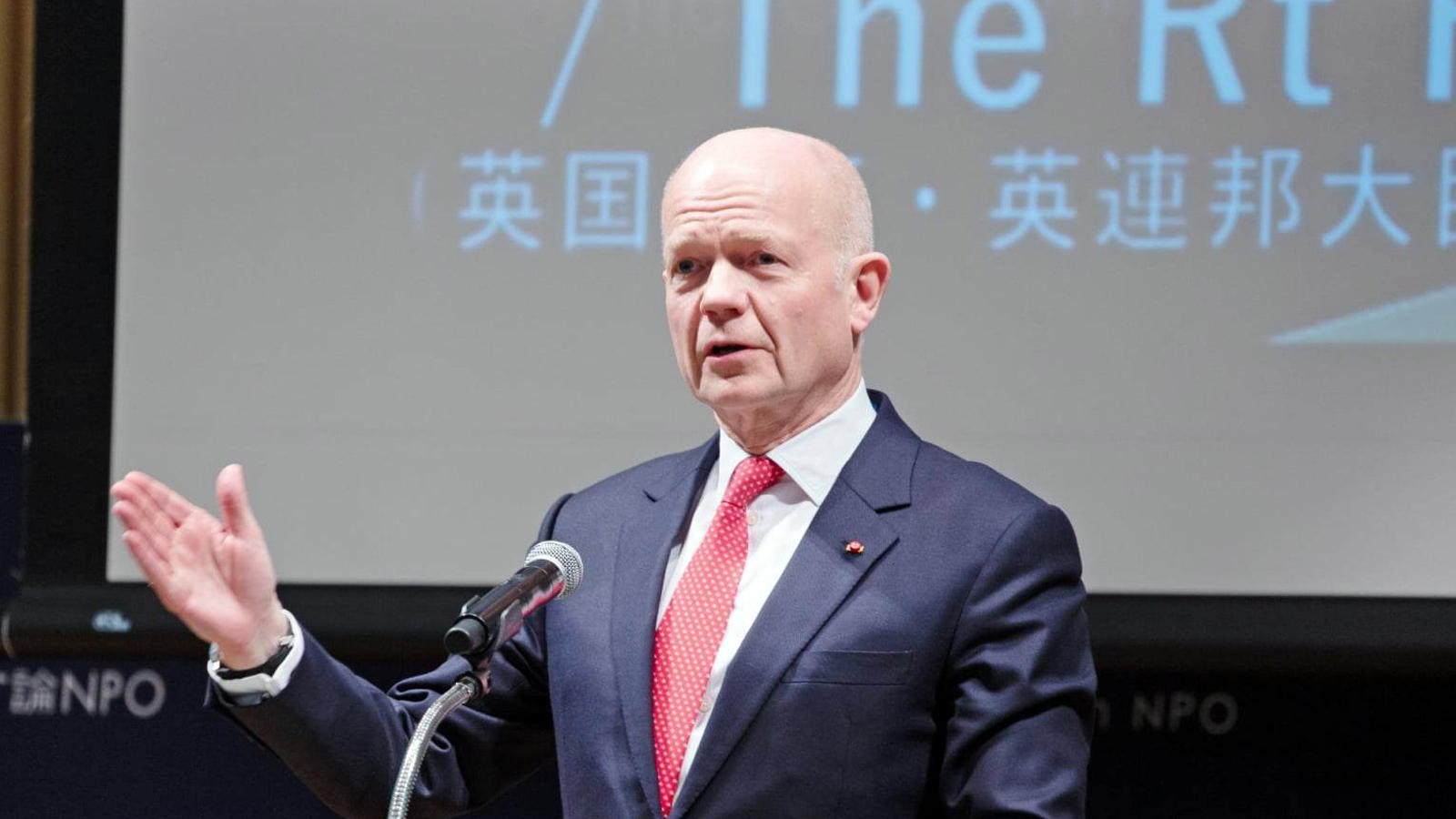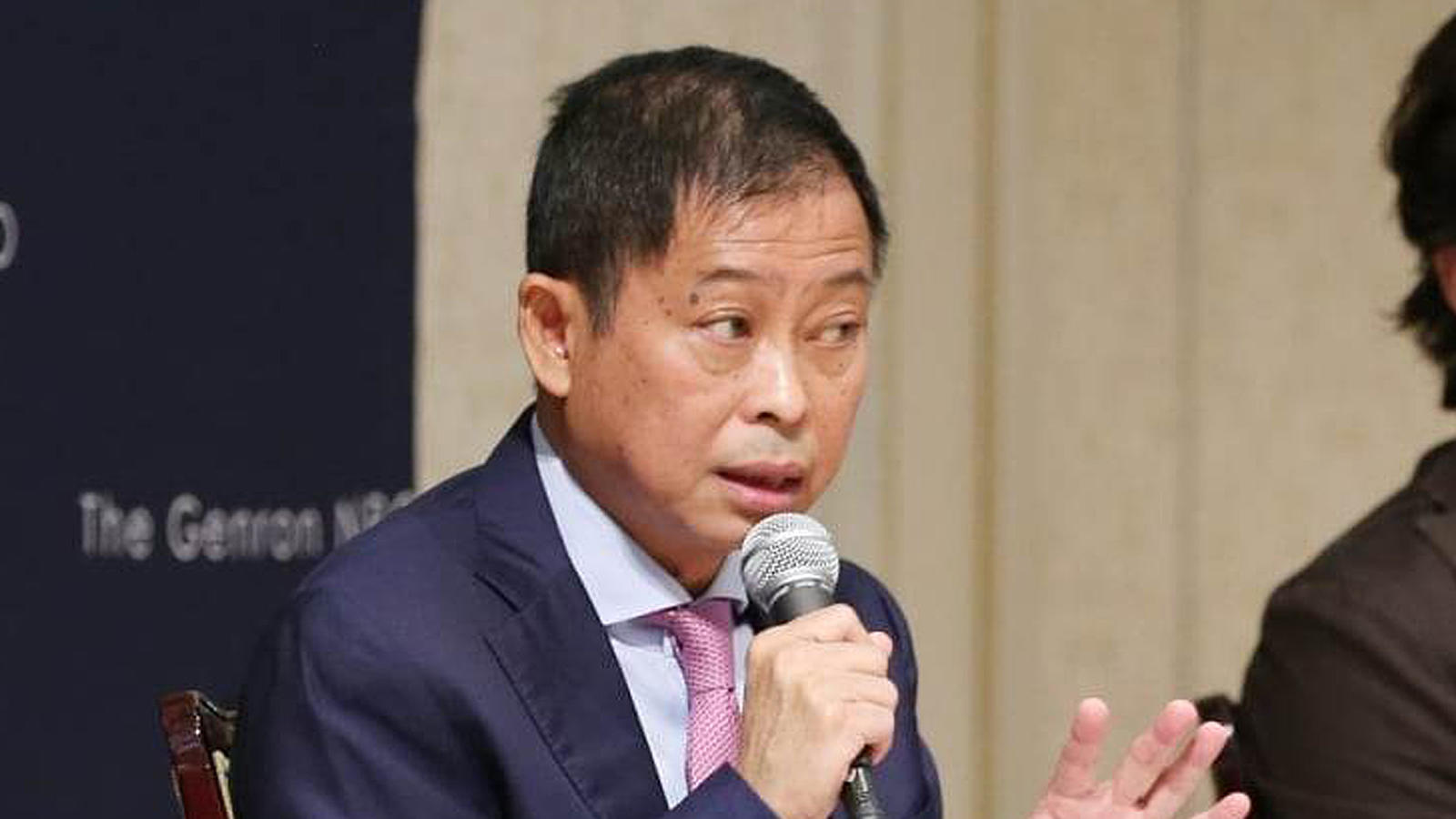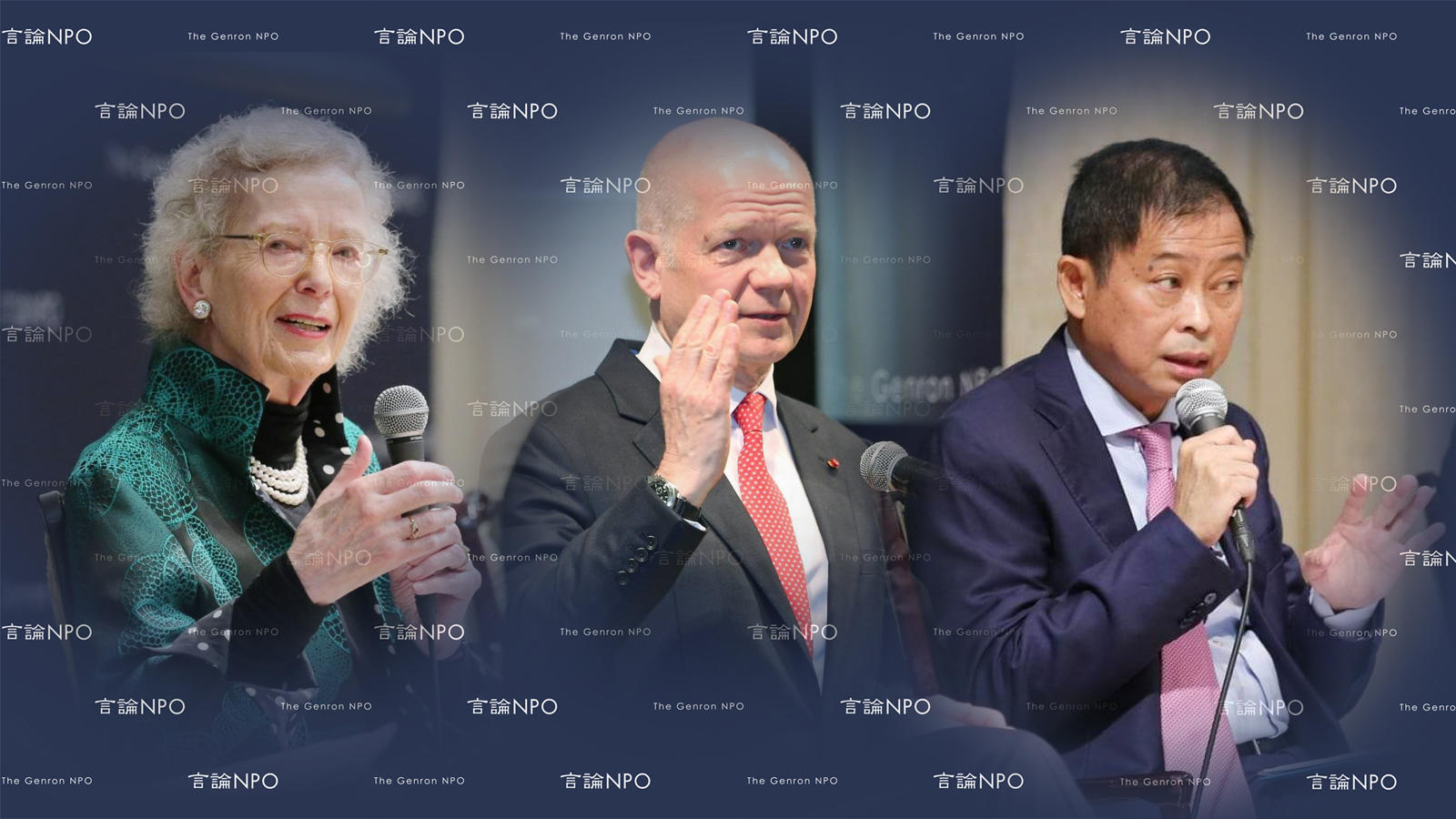The Open Sessions of Tokyo Conference 2023 were held on the afternoon of the second day, Friday March 24. Keynote lectures were given upon completion of the opening ceremony.
We are on the brink of a precipice, but political will is lacking

Mary Robinson is the former President of Ireland, former UN High Commissioner for Human Rights, and current chair of The Elders, and she took the podium as the first keynote speaker. She opened her speech by explaining that she believes that humanity faces "multiple existential crises," including the climate crisis, potential future pandemics, the risk of nuclear weapon use, and confrontations between the superpowers.
"I'll speak bluntly. We are on the brink of a precipice. But our leaders are not acting with sufficient moral clarity, speed, or ambition to secure a peaceful and livable world. From cutting carbon emissions to strengthening arms control treaties and investing in pandemic preparedness, we know what needs to be done," Robinson argued. "The facts are clear that the political will is lacking."
She argued that political leaders must "place the global public good and a principled approach to multilateralism at the heart of their approach."
Robinson described Russia's war on Ukraine as an "illegal and flagrant violation of the United Nations Charter" that is being felt around the world, and explained that each countries' pursuit of their own national interest is "undermining the global unity" that is required to respond to Russia's aggression.
"It's incumbent on the states in all regions to uphold the UN Charter, and stand up for the core principles of sovereignty, territorial integrity, and independence," she said, but her words were not aimed only at Russia. She explained that all countries are responsible for "the erosion of international norms," including democratic countries, and pointed to the 2003 invasion of Iraq and Israel's violations of international law in occupied Palestinian territories as examples.
She warned the audience however that the world should avoid letting its anger about "President Putin's aggression" detract from efforts to resolve other threats to global peace and stability, including climate and biodiversity crises, pandemics, and nuclear weapons.
"None of these challenges can be overcome by any one country alone, no matter how big its size, or how powerful its economy, or how strong its military. They require concerted and systematic cooperation by nation states, regional alliances, and global bodies, combining political commitment, intellectual innovation, and a ceaseless determination to confront issues with moral integrity and with humility and boldness, in equal measure," Robinson explained.
"In this regard, I applaud the initiative of the organizers of the Tokyo Conference to bring together experts from leading thinktanks from all G7 countries, plus Brazil, India, and Singapore. Such cross-border exchange is indispensable if we are to defend and strengthen multilateralism in the face of deepening global divisions."
Robinson then returned to the issues surrounding Ukraine.
"When we assess global unity in response to Russia's war on Ukraine, it is not a simple divide between democratic and autocratic states," she stated. "Some of the world's leading democracies, including India and South Africa, continue to abstain in UN general assembly votes on this issue."
She explained that many of the countries in the Global South see the west's desire for unity over Ukraine as a double standard, since similar solidarity wasn't shown during the COVID-19 pandemic when it came to sharing vaccines and other medical countermeasures, nor has it been seen in the "rich world's" response to the climate crisis.
Robinson called for a renewed commitment to international law and global equity, and proposed the establishment of a tribunal to prosecute the leaders responsible for the aggression in Ukraine. She and other members of The Elders believe that "it should take the form of a fully-fledged international criminal tribunal endorsed by the UN General Assembly to underscore its global legitimacy, and signal to all member states that peace and justice are two sides of the same coin and impunity will not be tolerated anywhere."
Citizens of all countries must pressure their leaders to take action
On the topic of nuclear disarmament and non-proliferation, Robinson believes that the only solution is greater commitment to multilateralism on the part of states in all regions, and the consistent application of international law. She also expressed her dismay at President Vladimir Putin making threats to use nuclear weapons over the past year. She is also concerned about the fact that he has pulled out of New START.
"His decision to suspend participation in New START, the strategic arms reduction treaty between Russia and the United States, presents a serious risk of a new global nuclear arms race developing," she explained, before expressing her hope that a way forward does exist.
"Leadership to highlight the threat of nuclear weapons is important. That is why The Elders support Japan's efforts to highlight nuclear risks as part of the G7 presidency. A strong statement from the G7 leaders on the nuclear threat would send an important message and should increase pressure on the P5 states in particular to finally live up to their commitments to disarmament under the non-proliferation treaty."
Robinson next turned to the climate crisis, equating its urgency to that of nuclear weapon proliferation, and called on Japan to show leadership by prioritizing the climate crisis in the lead-up to the G7 Summit.
"Many of the shocks that the world will continue to experience in 2023, such as energy disruptions, inflation instability, and food crises, can ultimately be linked to fossil fuel dependence," she said. "The war on Ukraine is a tragic reminder of these linkages."
She compared the benefits of renewable energy to conventional fossil fuels, arguing that the former will be the key to security, sustainability, and affordability, and then expressed her concern regarding the current Japanese government's climate agenda, which seems to be placing a focus on alternative, unproven technologies designed to increase coal power plant efficiency rather than provably effective renewable energy.
"The future of our planet will not be well-served if the titans of industry become obsolete and defunct because they didn't act in time to adapt to the realities of our changing climate and economic paradigms," she asserted.
Robinson provided a number of proposals regarding how the G7 could provide greater financial and other support to the Global South.
Robinson drew parallels between the response of the west to the Global South during the early stages of the COVID-19 pandemic as similar to its response to other issues ? i.e. somewhat lacking.
"The ongoing negotiations over the Pandemic Accord present is an important chance to address the inequities so starkly exposed and exacerbated by COVID-19, which have further eroded trust in the multilateral system in many quarters...The upcoming pandemic high-level meeting at the UN in September in another important opportunity to make progress on this and other crucial recommendations through an ambitious political declaration."
Robinson called on Japan to "play a leading role here as it has in the past on universal health coverage," which she described as a critical piece of the global health architecture with "solidarity at its core."
In conclusion, Robinson stated that what is needed in responding to the issues she spoke about is multilateral action and bold ethical leadership.
"The challenge is not one of understanding or insufficient knowledge," she said. "Our leaders cannot claim that they have not been warned about the dangers ahead, or been provided with credible, detailed proposals for action...What we now need is to strengthen and improve the multilateral system with the United Nations at its core to make it fit for purpose. This also means global citizens must work together through democratic institutions and public fora, such as this very conference, to bring pressure to bear on our leaders and hold them accountable for their actions."
Robinson concluded her speech with the words of former Japanese Prime Minister Eisaku Sato, who, for his work in promoting nuclear non-proliferation, received the Nobel Peace Prize in 1974 alongside Sean MacBride, the former Irish diplomat, politician, and peace activist.
"All peoples should be united in positive efforts to make peace a reality, and to strengthen the foundations on which that peace rests, so as to secure for all humanity progress and a better life."
The 'normal' world is over ? Democracies have to strengthen the networks between them and tackle the new world's challenges together

The next keynote speaker was former UK Foreign Secretary William Hague, who opened by reflecting on the effects of social media on politics, climate change, the pandemic, and war between major nations, and on the "certain arrogance" in the west regarding what those nations thought would be the inevitable spread of democracy. However, what actually happened was far from what was imagined.
"The 'normal' world is officially over," he said. "And now we are in a more disruptive and difficult and dangerous period, and in that period we do have to remember the responsibilities of democracies to renew democracy."
Hague's first point was regarding what democracies should do in this "new world." First, Ukraine must be supported.
"Democracy is also at stake. Ukrainians freely chose their president; they freely chose their own path of greater friendship with European nations, and if that freedom is destroyed then many other nations will not be safe. And when somehow that war is over in the future, it will be important to give sufficiently strong guarantees of future security to Ukraine so that this is not just one installment in a long series of wars. It will also be important to begin to work on the reconstruction of Ukraine."
Second, Hague reiterated Mary Robinson's proposal regarding support for the Global South.
"Opinion is different in India, Brazil, and South Africa even though they are democratic countries. We do have to understand the cultural and historical differences," he said. "We do have to appreciate the belief that the west has been hypocritical, or still behaves like empires, or doesn't appreciate the need for a multipolar world. And we will have to do much more to align our own interests with those of the Global South in many ways."
Hague's third proposal was for the construction of strong networks between leading democracies.
"Democracies have to strengthen the networks between them. That is taking place in many ways such as in the QUAD, including Japan...such as the G7," he explained.
Hague also spoke about the challenges faced by the world regarding social media, AI, and other technological issues.
"We have to do more to protect the truth. Democracies relies on some common understanding of facts and truth," he said, asserting that social media's rise has called that into question.
Hoaxes and so-called "fake news" have had a deleterious effect on democracy and its institutions, and it will be a major challenge to find a way to combat the trend by ensuring that information is true in the age of social media.
Finally, he asserted that the governance of artificial intelligence will become one of the most fundamental issues in the next ten years.
"Alongside climate change, the future of artificial intelligence will be the key issue of the 21st century. This is about to change everything, and will bring a massive change not just to jobs and businesses, but to democracy and geopolitics," he said. "It is vital that we generate ideas about the best process of governance of artificial intelligence. Artificial intelligence is the first major advance which could lend itself to authoritarianism because it is based on the central processing of vast quantities of data. So, we have to make sure that artificial intelligence is in line with the standards of democracy and that its governance is characterized by transparency, decentralization, and accountability, and that no one person, company, authority, or country is in sole charge of artificial intelligence in the future."
Responsibilities must be shared across borders in an interconnected world:
When tackling issues, we must focus on common ground, not on the differences between us

The final keynote speaker was Ignasius Jonan, former Minister of Energy and Mineral Resources and former Minister of Transportation of Indonesia, and he focused on the current economic situation in the world.
He explained that the country with the largest GDP is still the US, at more roughly five times that of Japan. China has far surpassed Japan on this measure, being almost four times higher than Japan, and it is closing quickly on the US.
"In addition, India recently has reached close to 3.5 trillion US dollars nominal GDP," he said. He explained that this was now higher than the UK, a situation that Jonan reminded the audience was once unimaginable to many. However, Jonan believes that multilateral efforts should not focus on such economic differences.
Jonan also pointed to how the internet and similar technologies are "reshaping the world." People in his own daughters' generation spend more time reading information on the internet and social media than they do watching television, as previous generations did.
"(It is) based on the free flow of information that the world has been following for the past ten years or so. It is very hard for us to have the so-called hypocrisy of any global policies that we are implementing at the moment."
That being said, Jonan had some proposals.
"First of all, try to bring the Global South and other significant developing countries in Sub-Saharan Africa, Northern Africa, the Middle East, and Southeast Asia to sit down and find common interests. And also not focus on the differences," he said, and compared the ethnic makeups of Japan and Indonesia to hammer his point home.
While Japan is generally considered to have very little ethnic diversity, Indonesia has "800 ethnicities, so the way (the different ethnic groups) value freedom might differ. Indonesia is, by religion, the largest Muslim country in the world...if we implement the same value of freedom from Japan to Indonesia, the social fabric might react differently."
Jonan reminded the gathering that Earth is the only planet humanity has, adding that mankind should direct its focus to resolving the problems surrounding climate change, peace-building, and other global issues shared by all.
Finally, he implored the G7 countries to show the Global South the necessary leadership and to "lead by example."
"It is very hard for many countries and many inhabitants in the Global South and in emerging markets to understand why the G7 is making these kinds of policies (that it demands other countries), while at the same time (not following the policies themselves) in many parts of the region."

Post a comment